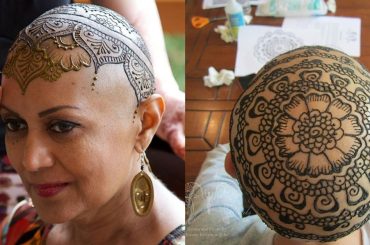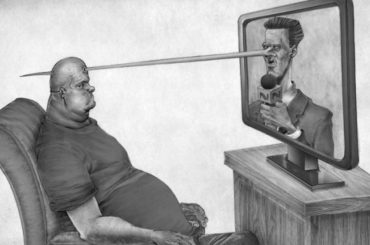I fantasize about beauty. I fantasize about grace. I fantasize about being from outer space. Dream a small dream. Bring some faith. All in the name of making everything appear fantastic. Beautiful daydreams Such imaginations. The plague that we can’t seem to get rid of. We sing and dance to the beat of a drum that keeps beating, scraping, and chopping us up.
The number of times I felt inadequate. The number of times I attempted to be. The image of the ‘perfect woman’ was etched in my mind long before I was able to comprehend it. Unfortunately, I am not that woman. And I’m not sure I’ll ever be it. However, many of us must deal with the difficulty of finding acceptance.
Acceptance that we will not be the most beautiful woman in the world or the country. A member of the elite group, broadcast and glorified for all to see. They are slender and tall, with lovely smiles that complement their symmetrical features. However, one contestant wanted to bring us back to reality by taking part in the competition without makeup.
The first in the 94-year history of the Miss England Contest. Described as revolutionary. Brave. Legendary. But is this the case? Or is it shallow to demonize makeup when she herself is endowed with flawless beauty? A discussion ensues. So let’s take a closer look.
#1 Melisa Raouf, a politics student, will be remembered as the first Miss England contestant in the contest’s 94-year history to compete without makeup.

Melisa Raouf, a politics student, will be remembered as the first Miss England contestant in the contest’s 94-year history to compete without makeup. She decided to forego makeup in order to inspire other women to embrace their natural beauty. The 20-year-old not only defied contest stereotypes, but she also advanced to the Miss England final.
Melisa, from south London, will now compete for the title against 40 other women, which will be announced on October 17. She intends to compete “bare-faced” once more. Melisa said of the competition with Tyla, “It was quite a daunting experience but so amazing to win this way.”
“It means a lot to me because I believe that many girls of various ages wear makeup because they feel pressured to do so.” If someone is comfortable in their own skin, they should not be forced to wear makeup,” she continued. “Our flaws shape who we are, and that is what distinguishes each individual.” I believe that people should accept and love their flaws and blemishes, because true beauty lies in simplicity.”
#2 She decided to forego makeup in order to inspire other women to embrace their natural beauty.

The young lady went on to say that wearing makeup made her feel uneasy and hidden. “I never felt like I met beauty standards,” she continued. “I recently accepted that I am beautiful in my own skin, which is why I chose to compete without makeup.” I’m still confident in myself, even though I’m all covered up with makeup. This is who I am, and I am not afraid to be myself. “I wanted to show Melisa for who she truly is.”
“I’d love to use my Miss England platform to empower natural beauty and rid the world of this toxic mindset,” Melisa said. “Because mental health is such a sensitive subject, I want to make all girls feel good.” I simply want to be free of all beauty standards. “I believe that all girls are beautiful in their own unique way.”
This leads us to an intriguing conundrum, but the main question here is: why do people of all ages choose to wear makeup? Melisa’s point of view appears to be based solely on the population with insecurities, those who see makeup as a way to conceal their flaws, and those who want to achieve the ‘artificial’ beauty seen on the front pages of magazines and on television.
However, it is difficult to agree with her completely, especially as a woman who has been mocked for not being ‘perfect.’ I’ve always thought that natural beauty was superior to those who chose to cover their faces with makeup. But as I’ve grown older, I’ve realized how much we stigmatize the ‘other.’ To us, the ‘other’
#3 The 20-year-old not only defied contest stereotypes, but she also earned a spot in the Miss England final, where she will compete without the use of any cosmetics.

To be honest, whether you wear makeup to feel beautiful in your own skin, to develop your artistry, to experiment with all the textures, glitters, and pretty colors, or simply because you enjoy it, it does not make you superior or inferior to someone who does not, and vice versa.
As stated on Fait avec Coeur, when we demonize makeup, we deny people the experience of shamelessly enjoying makeup. Within the health and wellness industry, there is a widespread belief that wearing makeup is ‘bad.’ It’s now fashionable to go for a completely ‘natural look,’ or to forego makeup entirely. We should all be able to make our own choices without fear of negative judgment or a hierarchy of which is ‘better.’ Allowing choices is what empowerment is all about.
The message in this story is sweet but dated, and it also falls a little flat. Is the person who represents natural beauty in this anti-aging world really a 20-year-old with flawless skin and undeniably attractive facial features? That’s a question worth debating. But I believe it is related to the question of why beauty pageants are still popular.
#4 “It was a terrifying experience, but it was so incredible to win this way,” Melisa said. “I believe that many girls of various ages wear makeup because they feel pressured to do so.”

Throughout its history, the concept of the beauty pageant has been both praised and criticized. Although its origins can be traced back to ancient Greece, the popular version was created in the 1850s. Beauty pageants, as explained by PBS, are primarily about putting idealized versions of femininity on a competitive stage and awarding the winner a ‘royal’ title and crown, but they are also about using femininity to represent other issues.
According to historians Colleen Ballerino Cohen and Richard Wilk, “whether the title is for Miss Universe or the Crooked Tree Cashew Queen, these contests showcase values, concepts, and behavior that exist at the center of a group’s sense of itself and exhibit values of morality, gender, and place.” The lone woman is elevated to the status of a symbol of national identity, group values, and pride.
Others argue that pageant beauty standards do not represent all women, with contestants generally tall, thin, and fair-skinned, resembling traditional Western beauty standards. While beauty pageants may appear to be a fantastic way for women to raise money, gain confidence, find a fun hobby, and better themselves, others believe that pageants waste money and turn women into sexual objects, showcasing beauty first and talent and personality second.
#5 Beauty pageants have been praised and criticized, but one thing unites natural and makeup-enhanced beauty: it’s all just skin deep.

Natural and enhanced beauty have one thing in common: they are both superficial. Regardless of your aesthetic preferences, I am a firm believer in ‘what’s inside that counts.’ I also believe in makeup; whether you want to look better for yourself, express yourself, or it’s just a fun routine, makeup is not the new evil.
If these so-called beauty contests are to continue indefinitely, I’d like to see our changing understanding of beauty shift alongside the models chosen to compete in these contests, because these only exist to perpetuate long-standing stereotypes of outward acceptance.
For the time being, the best they can do is add a “bare-faced model” category. Angie Beasley, Miss England organizer, told CNN about the decision to launch the new format: “It encourages contestants to show us who they really are without the need to hide behind makeup and filters on social media.”
“We introduced this round of the contest in 2019 because we were receiving so many entry images from contestants covering their faces with thick makeup and using filters,” she explained. “Since then, contestants have posted their images on social media in order to participate in this round.” This is the first time I’ve seen a contestant compete in a semi-final without makeup, and she stated that she felt empowered in comparison to the other contestants.”
“I’m all for makeup to enhance your natural beauty, but there’s no need for young people to wear it so thick that it looks like a mask,” she concluded. Talk about gatekeeping…
#6 The Miss England final will take place on October 16-17. We wish Melisa and the other contestants the best of luck!

This will probably be a debate for years to come, as beauty standards are about more than just aesthetics and preference. I doubt we’ll reach an agreement until we learn to accept one another for the people we want to be.
Let us know what you think in the comments: do you prefer the ‘natural beauty’ movement or are you a makeup addict? Remember to upvote and follow for more diverse content! Have a wonderful day, xoxo
#7 Although the message is positive, it has sparked an online debate about beauty and the demonization of makeup. Let us know what you think in the comments!

#8

#9

#10
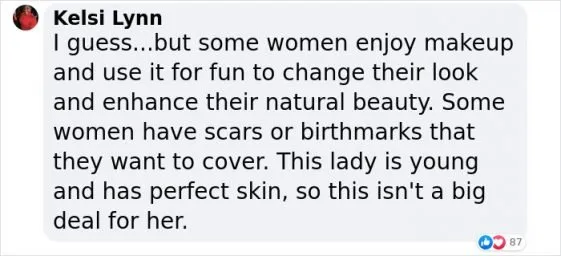
#11

#12

#13

#14

#15

#16
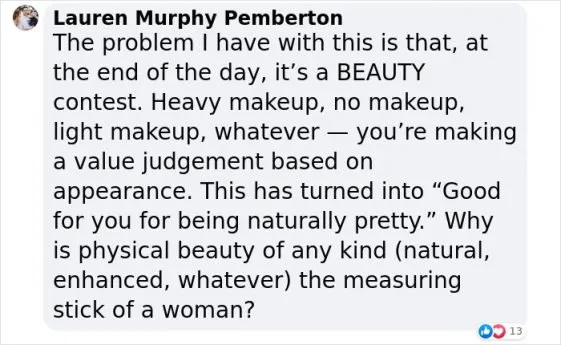
#17

#18
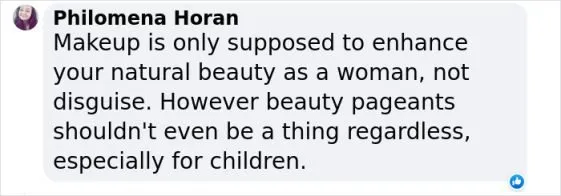
#19

#20

#21

#22

Credits: bananalanguage.com




